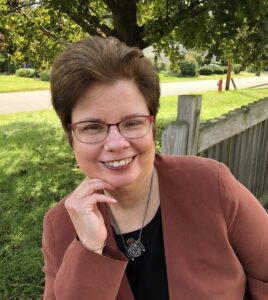
Opening Spaces: Elanah Sherman Interviews Melissa Marshall
This month, Opening Spaces’ editor Elanah Sherman, interviews Melissa Marshall. A graduate of UConn School of Law and a person with a lifelong mobility disability, Melissa is an esteemed trainer in the Americans with Disabilities Act (ADA) and other disability-related laws, as well as a leader in disability sensitivity education. As a college student (Hampshire, ‘83), she was one of the first to concentrate in what later became known as disability studies.
 In addition to freelance consultations and trainings all over the country, Melissa’s professional history includes numerous high-profile positions, including Founding Executive Director of Disabilities Network of Eastern Connecticut (DNEC) and Coordinator of the CT Cross-Disability Lifespan Alliance. She currently serves as Director of Policy and Programs at The Partnership for Inclusive Disability Strategies, where her work concentrates on disaster management and is international in scope.
In addition to freelance consultations and trainings all over the country, Melissa’s professional history includes numerous high-profile positions, including Founding Executive Director of Disabilities Network of Eastern Connecticut (DNEC) and Coordinator of the CT Cross-Disability Lifespan Alliance. She currently serves as Director of Policy and Programs at The Partnership for Inclusive Disability Strategies, where her work concentrates on disaster management and is international in scope.
Sherman interviewed Melissa (via email) about access to the outdoors and its personal meaning to her.
Question: One of the reasons I wanted to interview you, Melissa, is because you probably would agree that ‘outdoorswoman’ is not a label that comes to mind about you! Like many people, with or without disabilities, you appreciate the indoors and its comforts, and that’s why I was curious about your open space attitudes. Do you have memories of being a child with a mobility disability who had limited access to the outdoors?
Answer: I agree that I wouldn’t describe myself as an ‘outdoors woman.’ I went camping in a tent once in the 1980s and vowed never to do it again. In my defense, the person who had agreed to bring me a sleeping bag and a cushion forgot to do this. She is an outdoors person and didn’t see why this was a big deal. I have kept my vow, even though I have attended music festivals and advocacy retreats where I may have led people to believe that I was camping. The Radisson knows otherwise.
I had much more mobility as a child than I do now, so I didn’t feel particularly deprived of access to outdoor spaces growing up. I am also of a generation where it was expected that kids would play outside all day during the summer and on weekends during nice weather. I wasn’t able to do adult-supervised structured activities like gym, but I did fine playing outside with my peers. They made allowances for me without any adult instruction.
Question: Do you experience the outdoors differently now?
Answer: I experience the lack of outdoor spaces now. Twenty years ago, I was able to walk unassisted anywhere much of the time. I loved going to the West Hartford and Farmington reservoirs. I would ‘hike’ maybe a mile at a time one or more days per week. I loved doing it, even in the winter; actually, I loved it especially in the winter. I loved the tranquility of being in the woods by myself, especially when I had teenagers in the house. I miss having the ability to be alone in a somewhat isolated area. (Keep in mind that my standards for ‘isolated’ are very low – if I can’t either smell car exhaust or a McDonald’s, that counts as isolation!)
Question: What outdoor activities do you seek?
Answer: I think that I would like to do more in the woods or have better opportunities to explore parks.
Question: What kind of information do you need in advance regarding a trail?
Answer: Mostly, I need to know that the space is there and meets accessibility requirements. The more specific the information that is provided, the more convinced I am that an area is accessible. I really don’t like it when venues use terms like ‘disability friendly.’ That communicates to me that the operators are not serious about accessibility legal compliance. ‘Friendly’ to me seems as if the venue operator sees access as an optional good deed, not as a civil rights issue. We would never use the word ‘friendly’ in regard to any other group whose civil rights are protected and we shouldn’t do it to describe access for disabled people.
Question: A recent trend is that trails should not be evaluated according to standards, but instead be based on the impressions of individuals with disabilities. How do you respond?
Answer: I am deeply opposed to not evaluating spaces according to standards. When an individual assesses an environment from the perspective of themselves and their equipment, they may be excluding disabled people for whom that space may be neither accessible nor safe. Standards and codes are developed so as to be accessible to a broad range of disabled people. I agree that many standards are not stringent enough, for instance, the standard that ramps can have as steep as a 1:12 inch rise. The best way to foster accessible spaces is to advocate for codes to be made more stringent. Without the use of standards it is impossible to create access in a way that is consistent and meaningful.
If anyone is assessing the access of a space, they must have an in-depth understanding of any relevant codes and standards and must be extensively trained in conducting assessments. Using a mobility device, for example, only informs a user of what works for them, not for what is accessible to others. I feel the need to add that one does not need to have a disability to conduct access assessments. The requirement is knowledge and training.
(Note: Melissa agrees with Avalonia’s dual perspective on this issue: 1) Apply standards in all evaluations and 2) Invite people with various disabilities to experience and comment on all accessibility plans.]
Question: The “Disabled Hikers” website makes the important point that it is needlessly limiting and stigmatizing to restrict our idea of outdoor experience to preconceived assumptions. Instead, enjoying a bird feeder outside the window is as legitimate an outdoor experience as climbing the side of a mountain. What do you think?
Answer: As long as it doesn’t diminish the importance of legal obligations, I really like this perspective. Sometimes, I feel as if I marginalize myself because I don’t view my own participation in outdoor events as adequate enough. But no level of participation should be subjected to hierarchical judgments.
